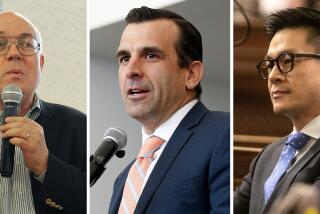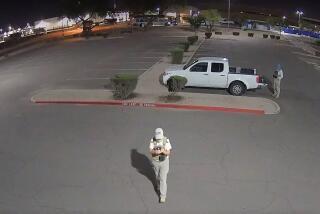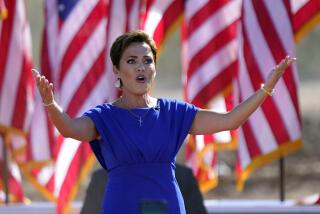Bid for Iraq vote recount intensifies
- Share via
Reporting from Baghdad — Senior politicians from Prime Minister Nouri Maliki’s ruling coalition warned Tuesday that Shiite Muslim-dominated southern Iraq could severely loosen its ties with Baghdad if the nation’s electoral commission failed to meet its demand for a manual recount of ballots in parliamentary elections.
The politicians, who also echoed Maliki’s warning Sunday that sectarian violence could return without a recount, accused the U.S. Embassy of working against them. In turn, Western diplomats and advisors to the Iraqi government described Maliki’s circle as terrified of losing power and said Iraq was entering a dangerous period.
Preliminary results of the March 7 balloting are due Friday, but the Independent High Electoral Commission has already made it clear it does not intend to conduct a ballot-by-ballot recount. The U.S. Embassy and the United Nations have said that the elections appeared to have been carried out in a credible fashion, with no evidence of widespread fraud.
An analysis of the latest figures by the U.S. military has projected that Maliki’s slate will lose the popular vote but win 90 parliamentary seats, compared with 87 seats for the Iraqiya list of his rival Iyad Allawi, a secular Shiite and previous prime minister. Such a narrow outcome would make it difficult for Maliki to cobble together a ruling coalition in parliament, observers say, explaining the unease among Maliki supporters.
Sami Askari, a member of Maliki’s inner circle and his State of Law election slate, described the electoral commission as a U.N. puppet. He also accused the CIA and elements of the State Department of working to bring Allawi, who has ties to the U.S. intelligence community, back to power.
“The Americans told me six months ago that the CIA and State Department are working on bringing back Allawi,” Askari said. “Within State of Law, many believe this.”
Askari referred repeatedly to a plot to bring down Maliki’s coalition and install Allawi’s slate, which includes figures associated with the late dictator Saddam Hussein’s Sunni Arab-dominated regime. Askari said if there was no recount, many Shiites would refuse to support a central government that they feared heralded the resurrection of Hussein’s Baath Party, which tormented the Shiite majority for 35 years before being toppled in the 2003 U.S.-led invasion of Iraq.
Askari warned that Shiites in the south have threatened to cut oil to Baghdad and freeze their relationship with the capital. He also said he worried that Shiites in mixed areas would be provoked into fighting.
“The question is not who will be the prime minister, but what will be the fate of the country. Will we face chaos? Will we be an unstable country? This is the question,” Askari said.
His remarks amounted to the most extensive explanation of the thoughts behind a statement Maliki issued over the weekend invoking his status as commander in chief in warning that a failure to hold a recount could lead to renewed sectarian violence. Askari made it clear that Maliki would act if the situation started to deteriorate. The U.S. Embassy has publicly denied any concern over the letter, although in private, many members of the international community and U.S. military have expressed anxiety over the remarks.
If the vote is seen as illegitimate, Askari said, the Shiite south could declare itself a semiautonomous region and hoard Iraq’s oil wealth as the country fragmented. He argued Maliki could be forced to act to restore legitimacy to the vote and guarantee a credible transition.
“Maliki insists on the recounting because he takes into consideration the security situation in Iraq,” Askari said. “He predicts and fears the situation will be dire. . . . He will use all legal and legitimate means to control the government.”
The prime minister’s confidant insisted Maliki was a democrat and that any actions taken in the coming days would be aimed at keeping the country intact. “He will have to consider what measures to take, but in the end, he will be ready to give the prime minister [post] to anyone who is chosen by parliament,” Askari said. “This is a democracy.”
Meeting Monday with Maliki, U.S. Ambassador Christopher Hill and Army Gen. Ray Odierno informed the prime minister that they did not support a recount, according to Iraqis and others familiar with the talks.
Others around Maliki warned that they would never accept election results they felt had been manipulated. “There is a dynamic inside the Iraqi society toward refusing the manipulation of their votes,” said Khalid Assadi, a member of Maliki’s Islamic Dawa Party and his State of Law coalition. “Even if the results are announced, we will not accept them.”
A Western advisor to the Iraqi government described Askari as the most sensible person in Maliki’s circle and worried about what might come next.
“They are very close to doing things that are really stupid,” the advisor said. “Knowing how all these people operate, aren’t you wondering if they have been planning to declare the election rigged. . . .
“It’s a very dangerous period. I hope it’s mostly bravado and tongue-whipping, but I’m not sure that it is.”
Salman is a Times staff writer. Staff writers Caesar Ahmed and Usama Redha contributed to this report.
More to Read
Sign up for Essential California
The most important California stories and recommendations in your inbox every morning.
You may occasionally receive promotional content from the Los Angeles Times.









